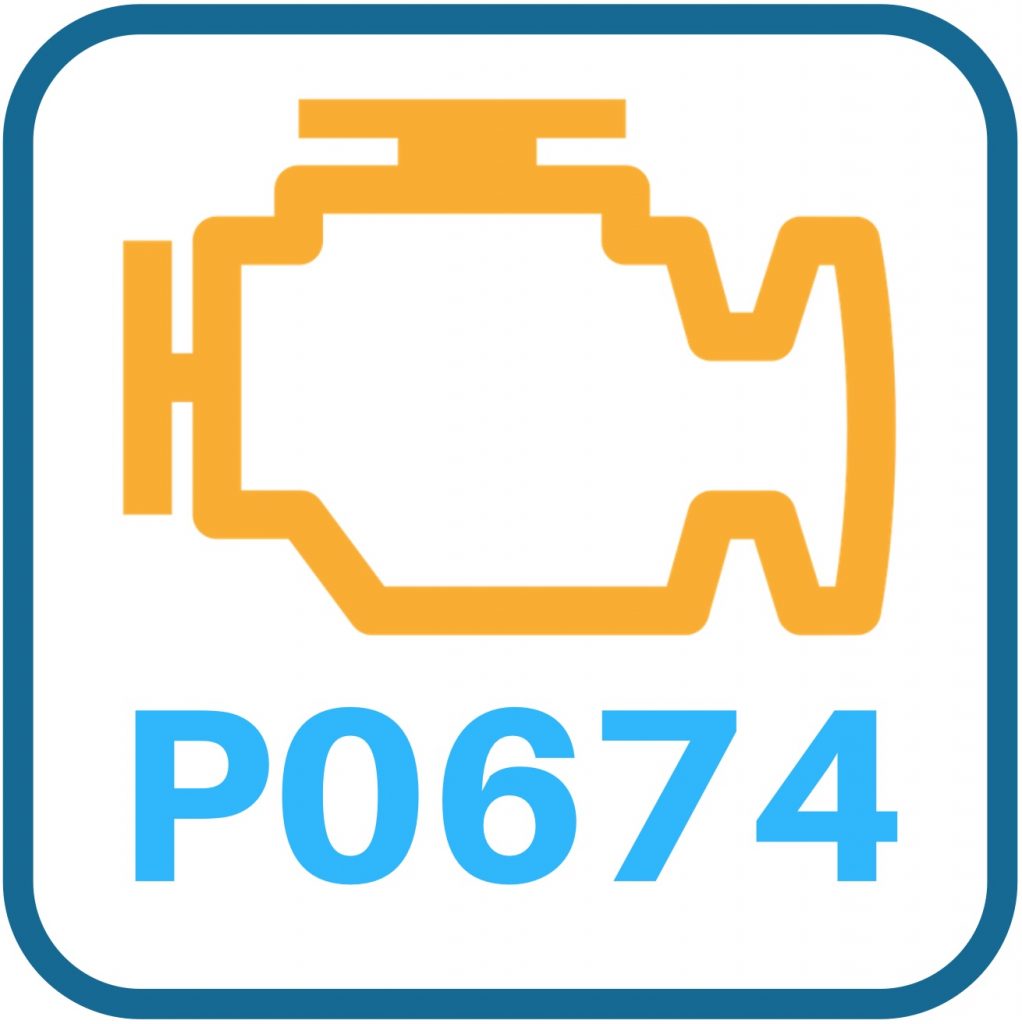P0674 is a fairly common DTC code found in diesel engines. It’s generic, which means it has the same definition for the Ford F350 as it would any other vehicle. The good news is, it’s a pretty straightforward diagnosis.
P0674 indicates that your F350’s fourth cylinder glow plug is not working. This code is typically caused by a bad glow plug or wiring issue (covered in detail below).
P0674 Definition

Here’s the definition of P0674:
Cylinder 4 Glow Plug
Diesel engines don’t have spark plugs. Instead, they use glow plugs to preheat the combustion chamber.
Glow plugs heat up the combustion chamber before your F350 starts. The “glow plug” light lets you know that they are doing their job. Once the vehicle is started, the heat and compression generated through diesel combustion are enough to keep the engine running (diesel engines have higher compression ratios than gas-powered motors), and the glow plugs are turned off.
The Ford F350’s PCM (powertrain control module, sometimes referred to as the ECM) uses data from the engine and transmission temperature sensors to determine if the engine is cold enough to warrant the use of the glow plugs.
Glow plugs are usually only needed when a diesel engine has been sitting for a while. It wouldn’t cool off enough while fueling up, for instance. That’s why the symptoms of P0674 are usually only felt when the vehicle is cold started.
Circuit
In the case of P0674, the code means that the circuit that provides power to the fourth cylinder’s glow plug is faulty. That’s it. It doesn’t specify if it’s open, short, low, or high voltage.
P0674 Symptoms: Ford F350
If your Ford F350 has P0674 there are likely to be some noticeable symptoms. Although one bad glow plug is usually not enough to bring a modern diesel engine down.
- Check engine light with P0674
- Hard start
- Misfiring (Until the fourth cylinder warms up)
- No start
- Low engine power until the engine warms up
- Diesel fuel smell from exhaust
If the engine starts, let it idle and build heat before driving it. You want enough heat in there that cylinder 4 starts to fire on its own. While your F350 may run and drive ok once it’s heated up, it’s still dumping unburned fuel into the exhaust until cylinder 4 starts firing.
With most diesel engines, having one glow plug out will not be enough for it not to start.
Ford F350 P0674 Diagnosis + Causes

While P0674 refers to a circuit issue, it also can be caused by a bad glow plug as well. Here’s how to diagnose this code in your Ford F350:
1. Determine if the glow plug is bad
There are a few ways that you can tell if the glow plug is functioning properly. If they are easy to get to, you can do the “swap test.”
Remove the fourth cylinder’s glow plug. Then, swap it with another glow plug (whichever is easiest to access). Once you do that, use your scanner to clear the OBDII memory.
Make sure your F350 is cold, go ahead and fire it up. Wait for the check engine light to come back on.
If the code stays P0674, you know there is a wiring issue, you’ll need to troubleshoot the harness.
If the code changes to P067X (X being the cylinder with the bad glow plug), replace the glow plug that you moved with a new one, and you’re done.
You can also use a test light to determine if a glow plug is bad. Here’s how to do it.
2. Check the Wiring Harness
Now that you know your F350 doesn’t have a bad glow plug, it’s time to check the wiring harness.
Check it for damage (think cracked wiring, bad ground, or loose connection at the glow plug). The glow plug wiring harness has fusible links, so if the harness is hot on one side of the link, but not on the other, you’ll need to replace it.
If it all looks fine, you’ll need to get an OHM meter and check the resistance at the glow plug. You’ll need to look up the wiring diagram for the exact engine and model year of your Ford F350.
Conclusion
P0674 in the Ford F350 is usually pretty easy to track down. Good luck diagnosing it!

